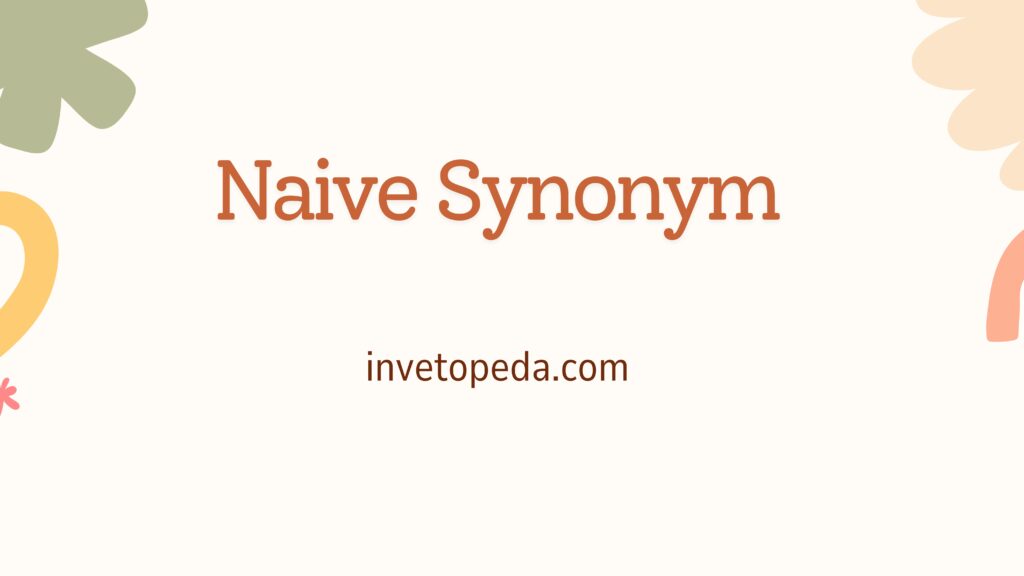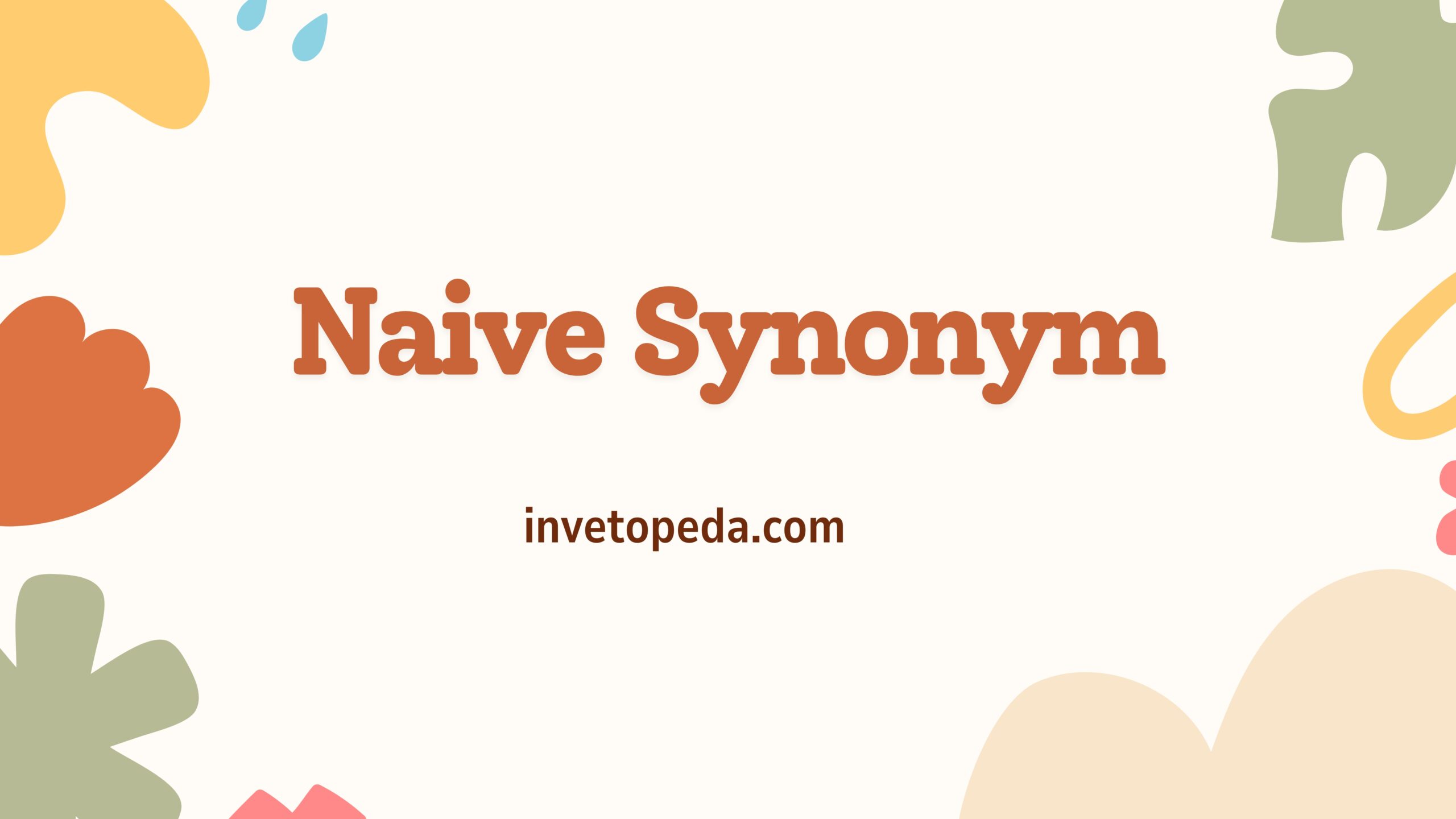Introduction
The English language contains a rich full of words, each with its own meaning and tone. A popular one is the word “naive” which is often employed to refer to an individual who is unassuming and inexperienced or too insecure. Although the word can be a bit negative or neutral, choosing the right word for a naive Synonym is crucial to ensure accuracy and clarity in written and oral communications. This article examines the various semantics of the term “naive,” provides accurate synonyms, and discusses the circumstances in which each word is most appropriate.
What Does “Naive” Mean?
To comprehend its meaning We must first understand what is meant by “naive.”. It is the name that comes from the French phrase “naif and is derived from the Latin “natives,” which means “natural” or “native.” Today, “naive” means someone who is:
- The lack of experience and sophisticated
- Does it look innocent or childlike from the view
- It is easy to trust without hesitation
The style and the intention of the phrase depending on the tone and intent of the sentence, “naive” could be perceived as hilarious or snooty.
Top Naive Synonyms and Their Connotations
1. Innocent
Definition: Free of guilt, sin, or moral infraction; indicates a lack of knowledge. The best use case is when used in situations in which naive means purity rather than ignorance. Examples: A child was not aware of reality.
2. Gullible
Definition: easily deceived or fooled. Application: It is appropriate in situations when naivety results in the lack of an ability to discern. For example, The victim was fooled enough to believe any scam emails.
3. Trusting
Definition: inclined to believe that people are honest and genuine. Application: A more positive or neutral synonym of naive. It is often employed to convey faith in the goodness of other people. For example, The woman was a believer in her nature and gave individuals confidence.
4. Inexperienced
Definition: Lacking knowledge or ability. Example: Perfect for describing a person who is new to the field or situation. Example: A trainee was inexperienced and trying to learn the business procedures.
5. Unsuspecting
Definition: Not being aware of the possibility of harm or danger. Example: Shows dangers due to an inexperienced or uninformed. Examples: An unwary tourist became a victim of pickpockets.
6. Childlike
Definition: Characteristics that a child would have, such as curiosity and innocence, but not necessarily suggesting ignorance. The use case is often utilized to indicate pureness and simplicity. Examples: Her playful passion was infectious.
Contextual Use of Naive Synonyms
Determining the most appropriate substitute for a nonsensical word will depend upon the context.
In Personal Descriptions
- The words innocent and confident are suitable when discussing the character of a person with a positive tone.
- Incredibly slick and unaware could have negative consequences and suggest a need for cautiousness.
In Professional or Academic Writing
- Inexperienced works best for describing people who lack technical or other job-related expertise.
- Naive could be a good choice for theoretical purposes, particularly in the fields of psychology and politics.
In Literature or Creative Writing
- The words “childlike” or innocent could trigger powerful emotional reactions and create a mood or mood.
- Synonyms, in combination, can be employed to produce a more detailed description of characters.
Nuances to Consider When Using Naive Synonyms
In substituting the naive with an equivalent it is crucial to think about tone, target audience as well as the intention. As an example:
- The difference between politeness and. Criticism: Be confident or innocent whenever it is necessary to remain polite. Use unassuming or gullible when you are highlighting the flaws or risks.
- In the formality of professional environments, the untrained or inexperienced tend to be more suitable rather than naive and gullible.
- Cultural sensitivity Certain terms could have unintentional connotations based on the context of culture or region use.
Why Choosing the Right Naive Synonym Matters
Language shapes perception. By choosing the appropriate word for the word “naive,” then you can be sure that the message you send is
- Simple – Ambiguity is lessened.
- True. Its emotional and intellectual tone is in line with the intention.
- Effective: The listeners and readers are able to understand your point of view without misunderstanding.
For fields like journalism, education, and counseling, precise speech improves the credibility of your work and encourages respectful dialog.
Conclusion
The term “naive” can be used in a variety of ways. However the use of it requires careful thought because of the layered meanings. If you’re writing your academic papers wr,iting a novel, or collaborating with professionals, using the proper word for a Naive Synonym will elevate your vocabulary and help you make your words better targeted. The range of synonyms is innocence to foolish Each synonym conveys an entirely different meaning. Learning these synonyms does more than just improve vocabulary; but also increases the precision and empathy when communicating.

FAQs About Naive Synonyms
Q1: What’s the ideal word for “naive” in the positive sense?
Innocent or innocent are the best words to use to describe someone positively, conveying sincerity and purity.
Q2: What synonym of naive is negative in significance?
Gullible usually is negative, implying that people are easily manipulated or manipulated.
Q3: Can the inexperienced be used in place of being foolish in a work
context?
Absolutely, unexperienced can be more formal and more preferred in formal and workplace environments.
Q4: Do you know an equivalent word for the word naive, which emphasizes confidence?
Trusting can be described as it suggests faith in other people without any negative implications as being foolish.
Q5: Are you naive and childlike the same thing?
It’s not quite. Naive may be a sign of a lack or a lack of awareness. Children’s is a way to portray wonder and innocence with a positive tone.

